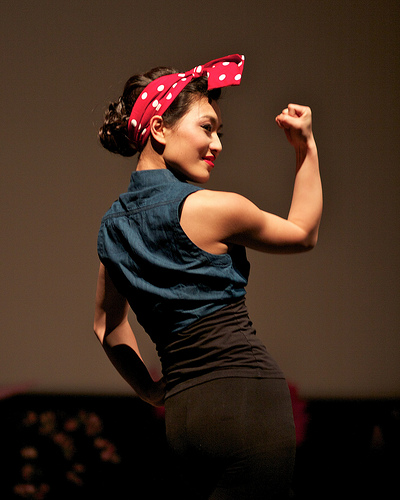A few days ago I took apart some of the thinking behind excuse making. Later, as I was thinking about my pet peeve – the “no talent for learning languages” excuse – I asked myself: what leads to “a gift of learning languages?”
The starting point: some things I’ve heard
“I’d love to learn and improve, but I’ve just got no talent for languages.”
“Hey, you’re really good at this. Must be a gift. You should learn more languages. Would be a shame to waste it.”
“Everything comes easier to her, and we’ve got to work twice as hard. She’s gifted at this interpreting stuff.”
“We’ve all been given talents, and all we have to do is find them.”
Now you’ll expect me to say that all of the above is complete nonsense, and that we should be more rational and pragmatic in the face of this talent-and-gift talk. You’ll want this to be shrewdly dismissed and you’ll appreciate some scientific evidence pointing to lack of gifted people and pre-determined talents.
Except that’s not what you’re getting. Each of these things is mostly untrue, mostly born out of inertia and lazy thinking. Each of these is potentially harmful and cringe-inducing for someone who cares about good language learning habits. And yet – these statements all rely on a sliver of truth. Let’s look at how they got that way.
Talent becomes myth: the coolest excuse is the one others give you
The reason I’m not playing any more guitar is this crazy kid on YouTube.
I should be learning my guerrilla languages faster – except Benny is the fast learning guy.
Spanish study is amazing and rewarding. But a friend of mine learns, teaches, translates Spanish, she’s on TV and stuff. And she’s my age!
This may not work for you. But I know a lot of people for whom others are a good source of excuses. They see how good others are at what they do. Then they conclude that they must be really talented at this, gifted even…and they stop trying themselves, since this is obviously not their own talent.
The mechanism is similar to the one which works for your excuses. The memory of your failures is mostly fiction – something you tell yourself to justify poor performance. Similarly, the way you see other people’s competence is not entirely objective.
You didn’t see Sungha Jung when he was failing, learning, almost giving up, getting it wrong.
Benny spends hours upon hours on focused, un-glamorous revision – and messes things up most of the time before he gets to where he wants to be.
And my Spanish-conquering friend spend exactly the same time as me at the same uni, going through the same pains and tribulations to get her Spanish right (just as I did with English).
But that’s glossed over. The myth of gift and talent is more convenient.
Looking for talent (in several strange places)
The day I stop quoting Seth Godin will be a strange day indeed. Anyway, here’s his 10-second rant on gifts and talents. The important part here is the often-overlooked duo of choices and habits – and, for language learners, realizing that they could lead to great or dismal results.
- You can choose to focus on the little things that work together to build your talent.
- You can decide what you enjoyed during this lesson – choose the thing you were most proud of.
- You can choose habits that work for you and discard those that don’t. You can do the same with schools, courses, teachers, schoolmates – without feeling guilty.
- You can pick and choose your time, intervals, material. You can empower your teacher to do the same – and grow into a habit of working that way later.
- You can choose questions that would help you understand your language study – or select your own materials. You can then get used to asking them often, and acting on the answers.
This will probably lead to two things:
Firstly, you will understand that talent isn’t given by mythical creatures or programmed before birth. It’s not conferred by social norms or other people’s stories, either. Talent will become, quite clearly, an interplay of these little choices and habits you make about every single language learning incident.
Secondly, you will be able to make it look easy. Have I told you about sprezzatura? It’s the ability to make something look easy – when it isn’t. “Studied carelessness” is the definition given by English dictionaries, and I’m loving the fact that it implies the obvious: study before carelessness.
How did your talent come about, reader? What choices and habits did you form to arrive at it? How could our language study be helped by understanding talent? Tell us!
Photo credit: –Mark– via Compfight
Wiktor (Vic) Kostrzewski (MA, DELTA) is an author, translator, editor and project manage based in London. When he works, he thinks about languages, education, books, EdTech and teachers. When he doesn’t work, he probably trains for his next triathlon or drinks his next coffee.
BRAVE Learning (formerly known as 16 Kinds) is a lifelong learning and productivity blog. If you enjoy these posts, please check out one of my books and courses.
My recent publications, and my archive, is now all available on my new project: PUNK LEARNING. Hope to see you there!


